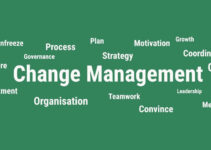Businesses and organizations are running their operations in a rapidly changing environment. The recent pandemic crisis has realized us one thing anything could happen and come from the external environment. Companies, management, and human resource team should be ready for the change and know how to deal with it. Today, we’ll discuss what is change management in HR; its importance, role, examples, and contribution to HR in CM.
What is Change Management in HR?
HR experts are familiar with the concept that they’re operating their business in a changing environment. They have a mindset of keeping their mind open to all types of new things coming from the external environment. The role of the HR team and leaders is to follow the structured approach in change management, and it comprises of following areas;
- Facilitating the learning and training program for the smooth transition
- Training the managers about the new upcoming policy or procedure
- Bring talents from various levels of the organization from top to bottom
- Communicating and discussing the change with employees and team members
It doesn’t matter whether the change could be big or small. The challenge to change management and HR professionals is to keep their business moving forward regardless of the changes that may come to the surface.
However, the objective of change management is to decrease the distraction level and time wastage that happen due to the change phase. Without a proper communication plan, the productivity of employees would decline and slow down the execution of the change program.
Importance of Change Management in HR
The change management in HR is significant because of the following reasons;
Offering Support System
The key reason managing change is significant for HR professionals; is that they have an obligation of conducting a training session and offering support and guidance to the employees during the transition phase. Employees would need support from their direct supervisors and colleagues in order to make sure of what the change leaders demand from them.
Employees require different types of training and some of the training sessions meet the demands and requirements of customers. Some of the training programs are as follows;
- Virtual classroom training
- Educational courses at the local community school or college
- Job shadowing
- Mandatory seminars
- On-job training sessions
Executing Change In Steps
Usually, it is the responsibility of HR professionals to implement and execute the change program. The best strategy is to execute the changes step-by-step and it would give employees sufficient time to become comfortable with the changes. The change implementation plan comprises various phases;
- Planning change and defining various roles
- Discussing the time, date, and schedule for executing the change
- Monitoring and evaluating the results
- Listening to the feedback
- Changing plans and making adjustments through communication
Decreasing Resistance to Change
The change initiative would cause stress and fear among employees. An open and transparent communication strategy is the best strategy for human resource managers to deal with change and resistance. In order to deal with stress and anxiety, it is the job of HR professionals to discuss with employees how the change program would benefit them.
Redefining Roles & Responsibilities
The other main obligation of HR professionals is to redefine the roles and responsibilities of team members and employees. Various factors compel businesses and organizations to change their roles and responsibilities;
- Changing consumer trends and their purchasing behavior
- Launching new procedures and technology
- Downsizing becomes necessary
- Economic instability
Role & Contribution of Change Management in HR
The role and contribution of change management in HR are as follows;
Streamlining Change With Organizational Culture
Every business organization has got specific mission and vision statement; it is the responsibility of human resource professionals to make sure that the organization is living up to its core values. If some activities and actions are compromising the company’s values, then it is the responsibility of HR professionals to speak. However, if the company is going through the transitional phases, then it would change the organizational culture and structure; HR professionals adjust the company’s policies and procedures accordingly.
Analyzing Impact on Engagement & Performance
It is significant for the company’s management and leadership to analyze the performance after implementing the change program. You can do so by conducting the one-on-one interview and asking them how the change program is impacting them, or you could ask them to write down their developmental plan. HR professionals also conduct surveys to know the well-being and views of employees during the transitional phase.
Conducting Training Session
Training programs are significant for the success of the change initiative; it allows change managers to bridge the skill gap between their existing knowledge and required expertise. If employees have been promoted to leadership positions, then it is the responsibility of HR managers to offer them relevant training.
Communicating Effectively
In order to boost the morale and confidence level of employees about the change program; HR managers should communicate effectively about the change initiative and tell them how the change program would benefit them. They also explain to them how the change program would impact their roles in daily routine life.
Examples of Change Management in HR
Some of the top examples of change management in HR are as follows;
- Merger and acquisition
- External environmental factors ranging from economic recession to pandemic
- Recruiting new employees and implementing new processes on a large scale in the organization
- Bringing new managers or promoting the existing ones
- Amendments and changes in the laws and regulations that impact the HR policy
- Launching structural changes like new CEO or the top executive
- Meeting the changing needs and expectations of the customers
- Developing a flexible working policy for employees and team members
Conclusion: What is Change Management in HR?
After an in-depth study of what is change management in HR; we have realized that the human resource department plays a significant role in the transitional period. If you are learning about the contribution of HR and CM, then you should keep in mind the abovementioned roles and benefits.
References
Ahsan is an accomplished researcher and has a deep insight in worldly life affairs. He goes Live 3 days a week on various social media platforms. Other than research writing, he’s a very interesting person.


